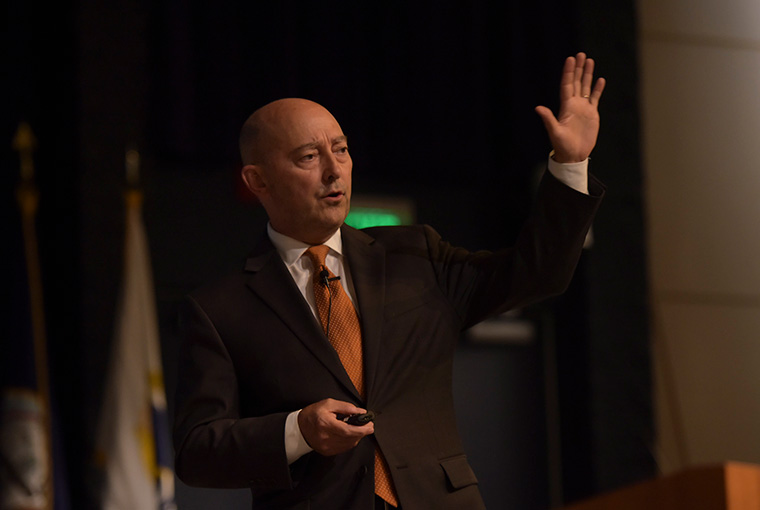Stansfield Turner Lecture 2019: Retired Navy Adm. Stavridis Says 'Confront Where Must, Cooperate Where Can'

NEWPORT, R.I. -- Retired U.S. Navy Adm. James Stavridis spoke to U.S. Naval War College students Aug. 16 about the national security challenges and opportunities of the 21st century.
Delivering the annual Admiral Stansfield Turner Memorial Lecture, the former NATO supreme allied commander told his audience that one of the foremost threats to the United States is violent extremism, which takes many forms including extreme nationalism and racism.
"My first challenge for us, as we think about this world, is this violent extremism - which certainly exists in parts of radicalized Islam, but also exists in many other societies in many other ways," said Stavridis, who was dean of the Fletcher School of Law and Diplomacy at Tufts University from 2013 to 2018.
"We need to collectively begin to create solutions."
He said another challenge is nations that "live outside the norms of international law," such as Iran and Syria in the Middle East, Russia in Europe, Venezuela in Latin America and China and North Korea in Asia.
All have different variables. But in the case of China at least, Stavridis said, a reasonable strategy would be "confront where we must, but cooperate where we can."
In addition to those challenges, Stavridis said what has kept him up at night is the threat to U.S. cyber security. He cited the example of the cyberattack that was the first salvo in the 2008 invasion of the nation of Georgia.
"Do you think we are vulnerable here? In every dimension, our political democratic process, our finances - but the one we ought to worry about is the (power) grid," he said.
Another worry is what Stavridis described as America's best allies and partners "pulling apart" from one another, such as Brexit in Britain and Italy pushing back against the Brussels-based international alliances.
"The European Union and NATO, you feel those centrifugal forces pulling at it," said Stavridis, who served as NATO's supreme allied commander from 2009 to 2013. "To the West, the United States, kind of leaning back from some of our relationships in Europe."
In the United States, political gridlock is preventing forward movement, Stavridis said.
"Our political parties cannot achieve reasonable compromise. We have an anger industry that is pulling us apart. We are losing the capacity to negotiate in rational ways - not only between political parties, but between branches of government," said the former four-star admiral, who retired from the U.S. Navy in 2013.
"All of that ought to concern us."
Stavridis then posed the question: What do we do about it?
"The No. 1 thing we could do is listen better," he said. "To our allies, partners and friends. To understand Kim Jong Un, we ought to be talking to our South Korean friends. They understand him in every dimension, in ways we never will."
The harder task, he added, is understanding and listening to U.S. opponents.
"Doesn't mean we are going agree with them. Again, confront where we must, but cooperate where we can," he told students. "To cooperate, we need to understand. To confront effectively, we need to listen better."
Also, Stavridis implored students to take the next year to enrich their minds by reading books. He also advised them to cherish and protect American values such as liberty, freedom of education and the press and gender and racial equality.
As for the American military, Stavridis - former commander of an aircraft carrier strike group - said the U.S. armed forces need to change in composition.
"We are creating here in the United States a Space Force. I think that's a good move. I would argue that we need a Cyber Force even more, and even more quickly," he said. "Fifty years from now, military historians are going to look at us in 2019 and say, 'What were they thinking not to have a capable Cyber Force?'"
Stavridis praised the merits of "soft power," using the example of literacy classes for Afghan National Army soldiers. He also said the U.S. needs to compete in the "marketplace of ideas," including in new venues such as social media, to explain the "beauty of our values."
In conclusion, Stavridis said there are many ways to serve one's nation: hard power, soft power, education, emergency services.
"We should be encouraging our countrymen, in whatever country we represent, to serve together. I think that is part of how we meet the challenges that I feel we face in the United States today: our gridlock, our anger," he said.
"If we put our shoulders together to serve in the broadest sense of that term, I think we have the best chance of creating real security for our nation and for our allies, partners and friends."
To watch a news video about the lecture, or to see the speech in full, follow these links:
News feature https://youtu.be/GpxhEhQULEU
Full speech: https://www.youtube.com/watch?v=zzKXyIGjY6w&feature=youtu.be
